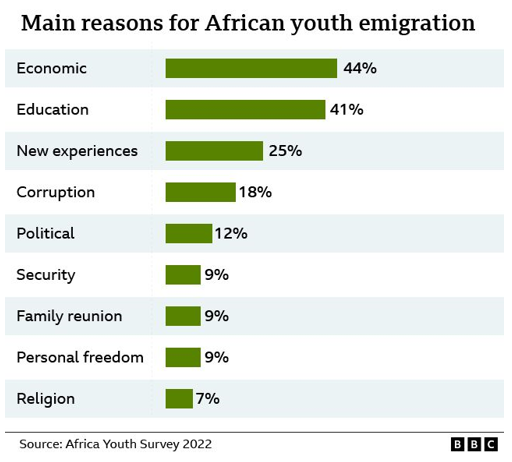Ghana, a West African country of approximately 31 million people, is poised to make education a priority with its vibrant and growing student population. Ghana’s education system is modeled after the British system. Universities in Ghana that offer postgraduate degrees include the University of Ghana, Kwame Nkrumah University of Science and Technology (KNUST), University of Cape Coast, Accra University of Professional Studies, and Ghana Institute of Management and Public Administration. Access to education has been expanded significantly in Ghana in recent years, especially for girls and children from disadvantaged backgrounds. Several policies and initiatives have also been implemented to improve education quality, including the introduction of a new national curriculum for basic education and the expansion of teacher training programs.
According to the World Bank, the gross enrolment ratio for primary education in Ghana was 94.2% in 2019, while the gross enrolment ratio for secondary education was 62.2% while the tertiary enrolment ratio is 17% (World bank., n.d.).
Several factors may have contributed to the significant decline in gross enrolment ratios (GERs) of Ghanaian students as they progress to tertiary education.
A few possible explanations are listed below:

- Limited capacity: There is limited capacity at tertiary education institutions in Ghana to accommodate all students who qualify for admission. Several factors contribute to this, including insufficient funding, infrastructure, and qualified teachers.
- High cost of tertiary education: Education at the tertiary level in Ghana is relatively expensive in comparison with that at the primary and secondary levels. Many low-income families find it difficult to afford tertiary education, particularly those who come from disadvantaged backgrounds.
- Mismatch between skills and job market demands: A mismatch often exists between the skills students acquire in tertiary education and the needs of the Ghanaian job market. Consequently, some students may abandon tertiary education due to lack of employment options or difficulty finding work after graduation.
- Lack of guidance and support: It is also possible for students to quit tertiary education because they lack guidance and support, particularly if they are the first members of their families to attend college. Lack of mentorship, financial assistance, or career counselling could all contribute to this.
- Brain-drain: Report by BBC (2022) explains that it is not uncommon for Ghana, like many other African countries, to experience brain-drain, with many highly qualified professionals leaving the country for better opportunities abroad. The result can be a lack of qualified teachers at tertiary institutions as well as a reduction in the quality of education

It is evident that dropping GER from secondary to tertiary education in Ghana is a complex issue that requires a multifaceted approach to solve. A few potential solutions include increasing funding for tertiary education, providing more scholarships and financial aid to students, improving the quality of education, and building closer links between tertiary institutions and the job market. In a world where colleges have limited capacity and mentors are lacking, online education is a great solution. A postgraduate education online can help Ghanaian students make a positive impact on their communities by providing them with the knowledge, skills, and expertise they need. The following are some of the benefits of an online postgraduate degree for Ghanaian students:
- Enhanced knowledge and skills: Students can gain knowledge and skills that can help them address complex issues in their communities by pursuing an online postgraduate degree. Myriad mentorship opportunities available from the online community will provide students with opportunities to develop critical thinking, problem-solving, and leadership skills.
- Increased job opportunities: By providing students with access to quality education on topics not available in their own countries and helping them to provide valuable services to their communities, online postgraduate degrees can increase their job prospects both in Ghana and abroad.
- Improved networking opportunities: Pursuing an online postgraduate degree can provide students with access to a diverse network of professionals and experts in their field. Through peer learning, collaboration on projects, and mentorship from professors, students can learn from each other and gain guidance.
- Addressing community needs: By enrolling in an online postgraduate degree, students can assess specific needs in their communities through a variety of courses available contrary to geographical limitations.
- Increased social mobility: Ghanaian students can advance in their careers and improve their socioeconomic status by pursuing an online postgraduate degree. As a result, they can be able to contribute positively to their families and communities and gain an increased sense of social mobility.
To sum up, a postgraduate degree online is a great way for Ghanaian students to develop their skills, knowledge, and expertise. The education students receive can assist them in addressing specific community needs, improving their economic standing, and increasing job opportunities.
Westford Uni Online offers students a unique blended learning experience that allows them to complete their degrees online with focus on delivering UK quality education. It gives access to pre-recorded classes and multiple chances to visit UAE for onsite workshops. These elements facilitate opportunities for networking and professional growth.
References
BBC News – (2022, June 18). African brain drain: ‘90% of my friends want to leave’.
World bank. (n.d.). School enrolment, tertiary (% gross) – Ghana. Retrieved March 23, 2023





